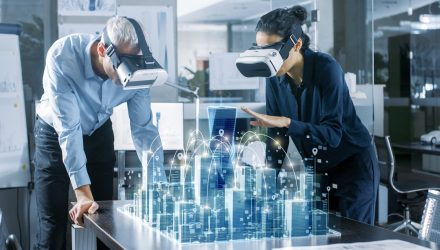Machine learning is a similar concept to AI. AI, as the idea that machines can act intelligently, is probably the broader concept. Machine learning is the idea that machines should be able to learn for themselves given access to enough data.
This might sound like the territory of geeks, but it could also be a way to deliver personalised recommendations and solutions in the future. It is already being used in retail—recommendations engines like Amazon’s, for example, often use some form of ML to learn from your preferences and deliver more accurate recommendations in future.
This type of engine often needs quite a lot of training, with plenty of input from the person on the receiving end of recommendations. This has already changed the way we shop, and could have further impact in future.
Augmented reality and virtual reality are very similar, and the terms are often used interchangeably by the uninitiated. Virtual reality is the use of headsets to shut out the world, and enter a different reality.
Augmented reality is an addition to reality while you remain in the world. One commentator suggested that if virtual reality enabled you to swim with sharks, augmented reality allowed you to watch a shark pop out of your business card.
AR Is Not The Newest Kid on the Block
AR is not the newest kid on the block by any means, and some retailers were experimenting with it around five years ago. However, it has come a long way since then, and the rapid increase in access to mobile devices, and the number of new devices that can use AR, mean that it may become more mainstream.
It might be useful in planning home interiors, and looking at what a product might look like in the home, or even just making the retail experience a bit more fun. Pepsi, for example, showed the use of this technology by adding a panel to a bus stop, startling commuters with sights of tigers and aliens roaming the streets. Its routine commercial application, however, may take a little longer to emerge.
Virtual reality is probably even more limited. The headsets are quite expensive, but I also think that the experience is a little too isolating for the user. It is hard to find many commercial uses for the experience beyond gaming. In retail, I think the best uses are likely to be in analysis or planning of stores by head office but even there, I think it is fairly limited.
Predicting changes
The difficulty with making predictions is the potential for it all to go horribly wrong. But it is the right time of year, after all, so here goes. I do not think that virtual and augmented reality will make that much difference in retail this year, at least, and possibly not for the next few years. On the other hand, I am excited by the potential of both machine learning and AI. I will be watching developments in this area closely.
This article has been republished with permission from SAS.
